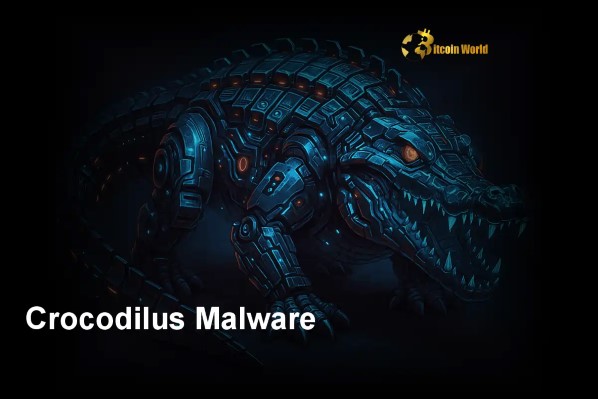BitcoinWorld

Urgent Warning: Crocodilus Malware Targets Crypto Wallets Globally
In the ever-evolving landscape of digital threats, a dangerous new predator has emerged: Crocodilus malware. Initially identified as a localized threat, this sophisticated mobile malware has significantly expanded its reach and capabilities, now posing a serious risk to users of crypto wallets and banking apps across the globe. This expansion marks a critical moment for cybersecurity awareness, particularly for anyone managing digital assets or conducting online banking via mobile devices.
What is Crocodilus Malware and Why is it Expanding?
The Crocodilus malware first appeared on the radar in March, primarily affecting users in Turkey. Its initial focus was on traditional banking credentials. However, like many successful cyber threats, it has adapted. The recent reports highlight a disturbing trend: its global spread and enhanced functionality.
The expansion is driven by several factors:
- Increased Target Surface: More people worldwide use mobile banking and, significantly, mobile crypto wallets. This provides a larger pool of potential victims holding valuable assets.
- Sophistication: The malware employs techniques like overlay attacks (creating fake login screens) and keylogging to steal sensitive information. Its ability to now target cryptocurrency-specific data like seed phrases and private keys makes it exceptionally valuable to attackers.
- Adaptability: Cybercriminals are quick to modify malware to exploit new opportunities. The boom in cryptocurrency adoption makes crypto wallet data a prime target for a malware attack.
How Does Crocodilus Malware Threaten Crypto Wallets and Banking Apps?
The primary danger of Crocodilus malware lies in its ability to intercept sensitive data entered by users. For banking apps, this means login credentials, account numbers, and potentially two-factor authentication codes. For crypto wallets, the threat is even more severe.
Here’s how it poses a risk:
- Seed Phrase Extraction: If you open your crypto wallet app while infected, the malware can potentially log your keystrokes or capture screens as you enter your seed phrase or recovery phrase. This phrase is the master key to your funds.
- Private Key Theft: Similarly, accessing or interacting with private keys on an infected device could expose them to the malware.
- Credential Harvesting: It can steal usernames and passwords used to access exchanges or web-based wallets through mobile browsers.
- Overlay Attacks: The malware can display fake login screens that mimic legitimate banking or crypto apps, tricking users into entering their credentials directly into the attacker’s hands.
This enhanced capability to target crypto assets significantly raises the stakes of a malware attack by Crocodilus.
Where Has This Malware Attack Been Detected?
The global reach of Crocodilus malware is a major concern. While it started in Turkey, recent campaigns have been identified in a growing list of countries. This indicates a coordinated effort by the attackers to broaden their victim base.
Reported affected regions include:
- Europe (e.g., Poland, Spain)
- South America (e.g., Brazil)
- United States
- Turkey (original point of detection)
This geographical spread underscores that the threat is no longer regional but a global cybersecurity issue requiring widespread awareness.
Who is Most at Risk from Crocodilus Malware?
Anyone using an Android device (as mobile banking malware typically targets Android) to access banking apps or crypto wallets is potentially at risk. Users who download apps from unofficial sources, click on suspicious links, or use outdated operating systems are particularly vulnerable. The ease with which this malware can spread through phishing attempts or malicious downloads makes a broad range of users potential targets for this type of malware attack.
How Can You Protect Your Crypto Wallets and Banking Apps?
Protecting yourself from threats like Crocodilus malware requires vigilance and proactive steps. Implementing strong cybersecurity practices is your best defense.
Here are actionable insights to enhance your security:
- Download Apps Only from Official Stores: Only install banking and crypto wallet apps from the Google Play Store or Apple App Store. Avoid third-party app stores or direct downloads from websites.
- Be Wary of Permissions: Pay close attention to the permissions requested by apps during installation. Be suspicious if a simple app asks for excessive permissions (like access to SMS, contacts, or accessibility features it doesn’t need).
- Keep Your Operating System Updated: Ensure your Android or iOS device is running the latest version of its operating system. Updates often include critical security patches that protect against known vulnerabilities.
- Use Reputable Mobile Security Software: Install a trusted mobile antivirus or security app and keep it updated. Run regular scans.
- Enable Two-Factor Authentication (2FA): Use 2FA on all your banking and crypto accounts whenever possible. Hardware keys (like YubiKey) or authenticator apps are generally more secure than SMS-based 2FA.
- Be Cautious of Phishing: Do not click on suspicious links in emails, SMS messages, or pop-ups. Verify the source of any communication asking you to log in or provide sensitive information.
- Review Account Activity Regularly: Check your bank statements and crypto wallet transaction history frequently for any unauthorized activity.
- Backup Your Crypto Wallet Seed Phrase OFFLINE: Never store your seed phrase digitally on your phone or computer. Write it down and store it securely offline in multiple safe locations.
- Consider Hardware Wallets: For significant crypto holdings, a hardware wallet offers the best protection against mobile and computer malware, as private keys are stored offline.
Taking these steps can significantly reduce your risk of falling victim to a malware attack targeting your financial or crypto assets.
The Growing Challenge of Mobile Cybersecurity
The expansion of Crocodilus malware is a stark reminder of the increasing threats targeting mobile devices. As smartphones become central to our financial lives, they also become prime targets for cybercriminals. The challenge for cybersecurity professionals and users alike is staying ahead of these evolving threats.
Protecting banking apps and crypto wallets on mobile devices requires a combination of secure technology and user awareness. The sophistication of malware like Crocodilus means that a single layer of defense is often insufficient. A multi-layered approach, combining updated software, security tools, and cautious user behavior, is essential.
Summary: Stay Vigilant Against Crocodilus Malware
The global expansion of Crocodilus malware, with its new focus on stealing data from crypto wallets and banking apps, is a serious development. Its presence in Europe, South America, and the U.S. means users worldwide need to be aware and take action. The ability to extract critical information like seed phrases makes this threat particularly dangerous for cryptocurrency holders.
By understanding how this malware attack works and implementing robust cybersecurity measures – such as using official app stores, keeping software updated, enabling 2FA, and being wary of phishing – you can significantly enhance your protection. Your digital assets and financial security depend on staying informed and proactive in the face of evolving threats like Crocodilus.
To learn more about the latest crypto security trends, explore our articles on key developments shaping cybersecurity for crypto assets.
This post Urgent Warning: Crocodilus Malware Targets Crypto Wallets Globally first appeared on BitcoinWorld and is written by Editorial Team





